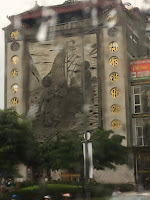Below is an interesting discussion from Facebook re: legalizing sex work.
Legalization involves two primary questions: 1) do you want the government to generate taxes from in-demand activities and use those taxes to battle unregulated activities; or 2) do you want the middle class to fund an ever-expanding war against mafias who have no competition outside of themselves, a matter easily resolved by cartels and territory carveouts?
CK: [Posts link to National Human Trafficking Day]
MM: One solution is to legalize solicitation, use police resources to protect sex workers, and tax the activity. Am I the only person who thinks it's counterintuitive to make x illegal when x has always had high demand, then raise taxes to fight x while criminal elements profit from x, requiring taxes to be raised continuously to combat illegal demand? What is more preferable? A continuously expanding police state that's almost always at a disadvantage against more profitable criminal forces, or legalized solicitation as a taxable activity and lower profits and influence for criminal groups (who now have competition)?
CK: What about the girls who didn't have a choice in the matter? It's why it's called human trafficking. [And] Making it legal is going to somehow make the pimps less greedy and take less girls because more women will voluntarily be sex workers because it's legal? I don't think so.
MM: If legalized and taxed, wouldn't such women have more choices and places to get help in the "formal" economy rather than being completely trapped in the informal/underground economy? Remember: by taxing the activity, more funds would be available for social services as well as police. Right now, taxpayers are revolting against government programs that do not directly benefit themselves because they see higher taxes but not better quality of life.
Playing cops and robbers in the modern era by raising taxes on law-abiding residents is backfiring by creating more debt and/or unchecked police expansion. The police simply cannot keep up against better funded, better equipped criminal groups, requiring them to demand higher taxes to expand capabilities; and to partner with federal agencies, losing some independence. By taxing an activity that already occurs due to high demand--and assuming political corruption is kept to a minimum--an independent revenue source would make it easier to fund social programs that help the very people you intend to help, but without the spectre of a continually expanding police state.
The police and federal LE agencies would still combat human trafficking, but they wouldn't be at such a disadvantage in doing so, and they wouldn't be in a position where their interests diverged from local taxpayers.
MM: You wrote, "Making it legal is going to somehow make the pimps less greedy..."?
In a way, yes. When the government competes wth criminals, they can put the criminals out of business. No pimps means better recourse for women who are in this industry. Whom would you rather regulate sex workers? Someone like you, subject to specific legal procedures, or an unregulated pimp who can use violence?
Remember: women who are trapped are still going to be helped, but with greater tax revenue, more middle-class taxpayer support, and less shame, because their activity will be somewhat "normalized" via gov fiat and will be under a more sustainable tax funding system.
You're also missing a key benefit--under legalization, police resources cannot be used against sex workers under any scenario. In fact, the reverse occurs--sex workers would be able to trust police, knowing that no court could possibly fine or jail them.
GL: According to countless studies, the vast majority of women who "volunteered" to be sex workers were sexually abused in the past. Healthy people don't do things like that for money. It's degrading, disgusting, and harmful to everyone who participates in it, whether they are willing to admit it or not.
MM: So what's your plan on eliminating sexual abuse? It's as if you're saying that the vast number of car accidents are caused by drunk drivers, so obviously we need to ban alcohol. It didn't work in Prohibition because the demand was still there. As long as demand for something [nonviolent] exists, we can either cede its business (and profits) to underground forces, or we can try to eliminate or weaken them through direct competition.
GL: Thank you for your question, and especially for writing respectfully about an issue on which we disagree. Here are my thoughts: "Ua Mau ke Ea o ka ʻĀina i ka Pono."
This is the state motto of Hawaii. It can be translated as "The life (or sovereignty) of the land is perpetuated in righteousness." Only by doing what is right can our communities, our nations, and our civilizations be preserved.
Demand for something evil is not a legitimate argument for its legalization. For example, there is a demand for hit men (murder for hire), and has been since time immemorial. While enacting and enforcing laws against this evil may not eliminate it completely, this course of action is infinitely favorable to the alternative of making our government by the people implicit in murder.
I respectfully refuse to concede that the best way to eliminate evil is to compete with it on its own terms. As Dr. King so eloquently stated, "Darkness cannot drive out darkness; only light can do that."
To your question on how to stop sexual abuse, I would highly encourage you to read the fightthenewdrug.org website. The movement is modeled after the anti-smoking movement, which reduced demand for tobacco from roughly 42% of the U.S. population to just 15% today, all by promoting awareness. Fight the New Drug has tons of great examples, success stories, and research-based ideas for combatting the abuse that is the foundation of sex for money.
MM: Thank you for your response. I've amended my comment above to specify that I meant demand for nonviolent products or services.
Once upon a time, Americans believed alcohol was evil. Who gets to decide what is evil? IMHO, the issue is whether the service or product is unduly coercive, which eliminates any violent products or services from the legalization discussion.
Your argument is more nuanced. You are essentially arguing that sexual services are the result of violence and are therefore a product of coercion. Such an argument fails because it is too broad and gives unchecked discretion to gov officials. For example, a paternalistic gov could ban violent video games because they are inspired by violence. Yet, something is not evil merely because it is connected to violence or evil--otherwise, all militaries would be banned.
To truly achieve a viable solution against coercive services and products, we must focus on services that directly compete with them and that seek to remedy the direct violence or evil that creates the services and products you dislike.
Legalization of drugs and sex is one path that creates direct competition and in doing so, weakens the underground entities' ability to use violence (pimps, etc.) to support their businesses. Using the new tax revenue from such legalization would also allow the greater social services you support, and in a much more consistent manner. Over time, if the social services are done properly, and if your premise is correct about the reasons some people participate in sex work or use drugs, then the evil you seek to destroy would be destroyed.
If such an endgame is achieved, however, it won't be done through ever-expanding cops-and-robbers battles between gov and mafias, where cutting the head of the current mafia or cartel boss merely results in another leader entering the void. It will be done through better economic opportunities for all persons and through more sustainable and politically viable ways of funding social services, such as increased tax revenue from legalization.
Bonus: more
here on the specifics of legalizing prostitution.
Bonus: I just watched a documentary on human trafficking. The problem is that once taken away from their parents, teenagers or younger women are isolated and under threat of constant violence because the pimps don't leave their side and confiscate their phones. They are too ashamed to call their parents, and do not trust the police.
One solution would be to designate all hospitals as "safe spots" for trafficked persons. If a person shows up and says she's a trafficked person, the hospital staff must immediately assign a guard to her and alert a social worker. The social worker would open a case file, work with the police, and provide shelter until the woman could be reunited with family. If the person has no family or doesn't want to return to her family, then she would be given access to the same social services as others and/or a woman's shelter. It is surprising that as of now, there are no universally accepted places where trafficked victims may seek safe shelter without threat of prosecution or forced interaction with police.
Bonus: watch Bigger, Stronger, Faster (2008) for an eye-opening view on steroid regulation. 5/5 stars.












